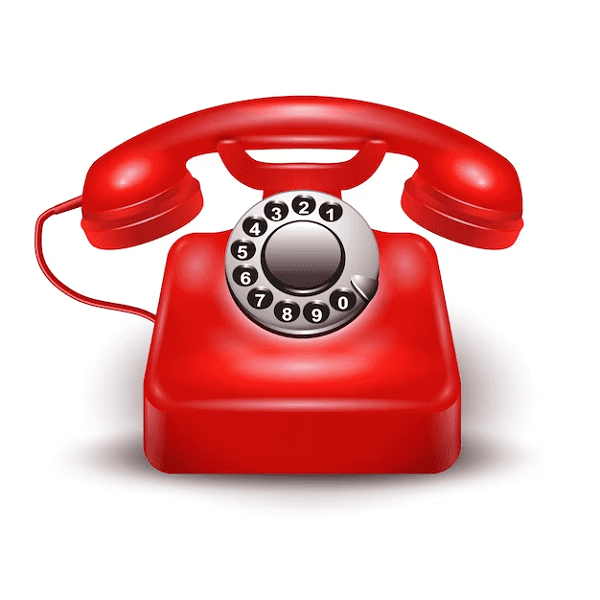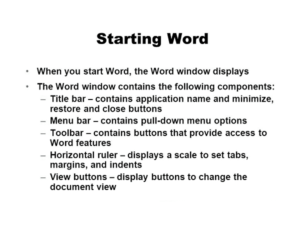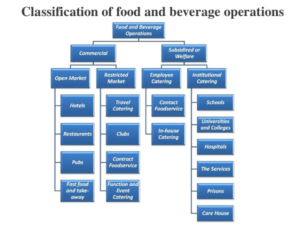Telephone Etiquette- Telephone etiquette is a set of guidelines and practices that help ensure effective and polite communication when using the telephone, whether for personal or professional purposes. Proper telephone etiquette is essential for making a positive impression, building relationships, and avoiding misunderstandings. Here are some key principles of telephone etiquette:
- Answering the Phone:
- Always answer the phone promptly. Ideally, it should be answered within three rings.
- Greet the caller with a polite and professional tone. For example, “Hello,” “Good morning,” or “Good afternoon.”
- Identify Yourself:
- Clearly state your name and, if applicable, the name of your organization or department.
- If you are answering a personal call, you can simply say your name.
- Active Listening:
- Listen attentively to the caller and avoid interrupting them.
- Take notes, if necessary, to ensure you understand the caller’s needs and requests.
- Speak Clearly and Enunciate:
- Speak in a clear, concise, and friendly manner.
- Enunciate your words to ensure the caller can understand you.
- Tone of Voice:
- Maintain a pleasant and professional tone throughout the conversation.
- Avoid raising your voice or using a harsh tone, even in difficult situations.
- Avoid Distractions:
- Minimize background noise and distractions while on the phone.
- Focus on the conversation and give the caller your full attention.
- Use Polite Language:
- Use polite and courteous language throughout the call.
- Say “please” and “thank you” as appropriate.
- Be Patient:
- Be patient and empathetic, especially when dealing with upset or frustrated callers.
- If you need to place a caller on hold, ask for their permission and thank them for their patience.
- Transfer Calls Appropriately:
- If the caller needs to be transferred, provide clear instructions and introduce them to the person to whom you’re transferring the call.
- Voicemail:
- Leave clear and concise voicemail messages if the person you are calling is unavailable.
- Include your name, contact information, and the purpose of your call.
- Call Waiting:
- If you need to answer another call while on the line, ask the caller for permission before putting them on hold or using call waiting.
- Call Endings:
- Always ask if there is anything else you can assist the caller with before ending the call.
- Thank the caller for their time and express your willingness to help in the future.
- Return Calls Promptly:
- If you miss a call or receive a voicemail message, return the call as soon as possible, ideally within 24 hours.
- Maintain Confidentiality:
- Respect the privacy and confidentiality of the information shared during the call.
By following these telephone etiquette guidelines, you can enhance your communication skills, build positive relationships, and create a professional image when using the telephone. Whether you are making personal calls or conducting business, these principles will help you communicate effectively and politely.
What is Telephone Etiquette
Telephone etiquette refers to a set of guidelines and behaviors that individuals should follow when using the telephone to ensure effective, respectful, and efficient communication. These guidelines are especially important in professional and business settings but are also relevant in personal communication. Proper telephone etiquette helps build positive relationships, improve communication, and create a favorable impression. Here are some essential aspects of telephone etiquette:
- Answering Calls:
- Answer the phone promptly, ideally within three rings.
- Greet the caller with a polite and friendly tone, such as “Hello” or “Good [morning/afternoon/evening].”
- Identify Yourself:
- Clearly state your name, and if applicable, your organization or department.
- For personal calls, state your name or a friendly greeting.
- Active Listening:
- Listen attentively to the caller without interrupting.
- Take notes if necessary to understand and remember the caller’s requests or information.
- Speak Clearly:
- Speak in a clear, articulate manner.
- Enunciate words and avoid speaking too fast.
- Tone of Voice:
- Maintain a courteous and professional tone throughout the conversation.
- Avoid raising your voice or using a harsh tone, even in difficult situations.
- Privacy and Confidentiality:
- Respect the privacy and confidentiality of the information shared during the call.
- Polite Language:
- Use polite and respectful language throughout the conversation.
- Say “please” and “thank you” as appropriate.
- Courtesy and Empathy:
- Be patient and empathetic, especially when dealing with upset or frustrated callers.
- Offer assistance and express your willingness to help.
- Transfer Calls Appropriately:
- If necessary, provide clear instructions when transferring a call to another person or department.
- Introduce the caller to the new contact.
- Hold and Call Waiting:
- Ask for the caller’s permission before placing them on hold or using call waiting.
- Keep hold times as brief as possible.
- Voicemail:
- Leave clear and concise voicemail messages if the person you are calling is unavailable.
- Include your name, contact information, and the purpose of your call.
- Call Endings:
- Ask if there is anything else you can assist with before ending the call.
- Thank the caller for their time and express your willingness to help in the future.
- Return Calls Promptly:
- If you miss a call or receive a voicemail message, return the call as soon as possible, ideally within 24 hours.
- Avoid Multitasking:
- Focus on the conversation without being distracted by other tasks or devices.
Adhering to telephone etiquette not only ensures effective communication but also helps in building and maintaining positive relationships in both personal and professional contexts. It reflects professionalism and courtesy in your interactions and contributes to a successful and respectful communication experience.
Who is Required Telephone Etiquette
Telephone etiquette is essential for various individuals and in a wide range of contexts. Here are some examples of who may be required to follow telephone etiquette:
- Business Professionals: Anyone in a business or professional setting, such as customer service representatives, salespeople, receptionists, and executives, should adhere to telephone etiquette to create a positive image for their organization and foster good relationships with customers, clients, and colleagues.
- Job Seekers: Job applicants may be required to follow telephone etiquette when conducting phone interviews with potential employers. It’s crucial to make a good impression in these situations.
- Customer Service Representatives: Individuals working in customer service roles must maintain excellent telephone etiquette to handle customer inquiries, complaints, and issues professionally.
- Receptionists: Receptionists often serve as the first point of contact for an organization. They should exhibit courteous telephone etiquette to greet and assist callers effectively.
- Telemarketers: Telemarketers should follow telephone etiquette to engage potential customers respectfully and ethically, even when making cold calls.
- Business Owners: Small business owners or entrepreneurs may need to use the telephone to communicate with clients, partners, or vendors. Proper etiquette can help them maintain good relationships and credibility.
- Medical and Healthcare Professionals: Doctors, nurses, and medical office staff should follow telephone etiquette to communicate sensitive and confidential information while maintaining patient trust.
- Educators: Teachers and school administrators often use the phone to communicate with students’ parents or guardians. Maintaining professionalism and courtesy is crucial in these interactions.
- Government and Public Sector Employees: Those working in government agencies or public institutions need to exhibit telephone etiquette when interacting with constituents, citizens, or colleagues.
- Volunteers: Individuals volunteering for organizations or helplines must adhere to telephone etiquette when assisting callers with their inquiries or concerns.
- Personal Communication: Even in personal contexts, following telephone etiquette can lead to more effective and respectful communication. This is important when speaking with family and friends or when conducting personal business over the phone.
Overall, telephone etiquette is essential for anyone who uses the telephone as a means of communication, as it helps ensure that interactions are conducted respectfully and professionally, and it contributes to positive relationships and effective communication.
When is Required Telephone Etiquette

Telephone etiquette is required in various situations and contexts to ensure effective and respectful communication. Here are some common scenarios when telephone etiquette is essential:
- Business and Professional Settings:
- When answering and making business calls, such as contacting clients, partners, or colleagues.
- During job interviews conducted over the phone.
- When working in customer service, sales, or telemarketing roles.
- Customer Service and Support:
- Handling customer inquiries, complaints, or issues over the phone.
- Providing assistance or information to clients or customers.
- Medical and Healthcare Industry:
- Communicating with patients or their families regarding appointments, test results, or medical information.
- Coordinating care and services within a healthcare facility.
- Education:
- Teachers and school administrators communicating with students’ parents or guardians.
- Conducting parent-teacher conferences over the phone.
- Government and Public Sector:
- Government employees interacting with constituents, citizens, or colleagues.
- Responding to inquiries related to government services or programs.
- Sales and Marketing:
- Contacting potential clients or customers to promote products or services.
- Conducting market research or surveys via telephone.
- Personal and Social Communication:
- When talking to family and friends over the phone.
- Handling personal matters, such as making appointments or reservations.
- Emergency and Crisis Situations:
- First responders and emergency services communicating with the public during emergencies.
- Crisis hotlines and support services providing assistance to individuals in need.
- Volunteer and Nonprofit Organizations:
- Volunteers assisting callers with inquiries, support, or guidance.
- Nonprofit organizations contacting donors, partners, or beneficiaries.
- Small Business and Entrepreneurship:
- Small business owners or entrepreneurs contacting clients, vendors, or partners.
- Handling business inquiries and negotiations over the phone.
- Government and Legal Proceedings:
- Legal professionals communicating with clients or involved parties.
- Government agencies conducting official business over the phone.
Telephone etiquette is not limited to specific professions or industries; it is applicable in various situations where telephone communication is used. By practicing good telephone etiquette, individuals can foster positive relationships, maintain professionalism, and ensure that their messages are effectively conveyed and received.
Where is Required Telephone Etiquette
Telephone etiquette is required in various locations and settings where telephone communication is an essential part of daily activities. Here are some common places and situations where telephone etiquette is necessary:
- Business Offices: In corporate and business environments, telephone etiquette is crucial for communicating with clients, colleagues, and partners. This includes answering calls, making professional calls, and conducting conference calls.
- Call Centers: Customer service representatives and telemarketers must adhere to telephone etiquette principles when interacting with customers over the phone.
- Medical Facilities: In hospitals, clinics, and doctors’ offices, healthcare professionals and administrative staff must use telephone etiquette when communicating with patients, scheduling appointments, and discussing medical matters.
- Educational Institutions: Teachers, administrators, and school staff should follow telephone etiquette when contacting students’ parents or guardians, as well as when conducting administrative tasks over the phone.
- Government Offices: Government employees, from city hall to federal agencies, use telephone etiquette to engage with constituents, citizens, and colleagues for official business.
- Retail and Customer Service: Retail employees often need to use the telephone for inquiries, stock checks, and customer service.
- Emergency Services: Dispatchers and first responders use telephone etiquette when handling emergency calls, providing guidance during crises, and coordinating responses.
- Home Office: Telecommuters and remote workers should maintain telephone etiquette even when working from home, especially when communicating with clients or conducting virtual meetings.
- Sales and Marketing Firms: Professionals in sales and marketing roles use telephone etiquette to communicate with potential customers, conduct surveys, and follow up on leads.
- Small Businesses: Owners and employees of small businesses require telephone etiquette for communication with customers, vendors, and business partners.
- Nonprofit Organizations: Volunteers and staff in nonprofit organizations often engage with donors, beneficiaries, and partners over the phone, necessitating proper etiquette.
- Legal Firms: Legal professionals use telephone etiquette when communicating with clients, opposing counsel, and court personnel.
- Public Libraries: Librarians and staff may use the telephone to answer inquiries or notify patrons about reserved materials.
- Hotels and Hospitality: Hotel staff often make and receive reservations, handle guest inquiries, and provide services over the phone.
- Airports and Airlines: Personnel working in the airline industry may use telephone etiquette when assisting passengers with reservations, inquiries, and flight updates.
- Social Service Agencies: Professionals working in social services, such as counselors or caseworkers, engage with clients and individuals seeking assistance over the phone.
- Public Transportation Services: Public transit agencies may use telephone etiquette when handling customer inquiries and concerns.
Proper telephone etiquette is essential in these settings to ensure that calls are handled professionally, efficiently, and respectfully. It contributes to the effectiveness of communication and can enhance relationships with clients, customers, and colleagues.
How is Required Telephone Etiquette
Telephone etiquette is essential for maintaining effective and respectful communication when using the telephone. Here’s how you can demonstrate proper telephone etiquette:
- Answering the Phone:
- Answer the phone promptly, ideally within three rings.
- Greet the caller with a friendly and professional tone, such as “Hello” or “Good morning/afternoon/evening.”
- Identify Yourself:
- Clearly state your name and, if applicable, your organization, department, or position.
- For personal calls, offer a warm greeting and state your name.
- Active Listening:
- Pay full attention to the caller without interrupting them.
- Take notes if necessary to understand and remember the caller’s needs or questions.
- Speak Clearly:
- Articulate your words and speak in a clear, concise manner.
- Avoid speaking too quickly, and modulate your voice for clarity.
- Tone of Voice:
- Maintain a polite and professional tone throughout the conversation.
- Stay calm and avoid raising your voice, even when addressing challenging situations.
- Privacy and Confidentiality:
- Respect the caller’s privacy and handle confidential information with care.
- Polite Language:
- Use courteous language throughout the conversation.
- Include phrases like “please” and “thank you” as appropriate.
- Courtesy and Empathy:
- Be patient, empathetic, and understanding, especially when dealing with upset or frustrated callers.
- Offer assistance and express your willingness to help.
- Transfer Calls Appropriately:
- If required, provide clear instructions when transferring a call to another individual or department.
- Introduce the caller to the new contact.
- Hold and Call Waiting:
- Ask for the caller’s permission before placing them on hold or using call waiting.
- Keep hold times as brief as possible.
- Voicemail:
- Leave clear and concise voicemail messages if the person you are calling is unavailable.
- Include your name, contact information, and the purpose of your call.
- Call Endings:
- Ask if there is anything else you can assist with before concluding the call.
- Thank the caller for their time and express your willingness to help in the future.
- Return Calls Promptly:
- If you miss a call or receive a voicemail message, return the call as soon as possible, ideally within 24 hours.
- Avoid Multitasking:
- Focus on the conversation without being distracted by other tasks or devices.
Proper telephone etiquette is not only a matter of courtesy but also a means of effective communication. It helps build positive relationships, whether in personal or professional contexts, and ensures that your messages are conveyed respectfully and clearly. Following these guidelines will contribute to successful telephone interactions and leave a positive impression on callers.
Case Study on Telephone Etiquette
Improving Telephone Etiquette at ABC Electronics Customer Service
Background: ABC Electronics is a reputable electronics retailer known for its high-quality products and customer service. However, in recent months, the customer service department has received several complaints from customers regarding poor telephone etiquette. Customers have reported issues such as rude or unprofessional behavior, long hold times, and incorrect information provided by agents. The company recognizes the need to improve telephone etiquette to maintain its reputation and customer satisfaction.
Challenges:
- High Volume of Calls: ABC Electronics receives a significant volume of customer inquiries, ranging from product questions to technical support, creating a challenging work environment for customer service representatives.
- Diverse Customer Base: The company serves customers from various backgrounds and locations, requiring agents to adapt their communication to different demographics and needs.
- Employee Training: Many customer service agents are new hires, and ongoing training is needed to ensure they have the skills and knowledge required to provide excellent service.
Solution: To address the issues and improve telephone etiquette, ABC Electronics took the following steps:
- Training and Development:
- Conducted regular training sessions on telephone etiquette for all customer service representatives. This training included modules on active listening, polite language, and dealing with challenging situations.
- Implemented a mentorship program in which experienced agents provided guidance and shared best practices with new hires.
- Call Handling Procedures:
- Updated call handling procedures to include a maximum hold time and guidelines for transferring calls to the appropriate department. This helped minimize long wait times for customers.
- Monitoring and Feedback:
- Introduced a system to monitor and evaluate calls for quality control. Supervisors listened to recorded calls and provided feedback to agents on areas that needed improvement.
- Recognized and rewarded exemplary telephone etiquette and customer service skills to motivate employees.
- Cultural Sensitivity Training:
- Provided additional training on cultural sensitivity to ensure that agents could effectively communicate with a diverse customer base.
Results: The initiatives aimed at improving telephone etiquette at ABC Electronics resulted in several positive outcomes:
- Increased Customer Satisfaction: Customer complaints decreased, and satisfaction levels improved, as customers experienced more professional and courteous interactions with customer service agents.
- Reduced Employee Turnover: The training and mentorship programs improved employee morale and reduced turnover rates. Agents felt more confident in their roles and appreciated the support provided by the company.
- Faster Resolution of Issues: With revised call handling procedures, customers had shorter wait times and quicker access to the appropriate departments, leading to faster issue resolution.
- Enhanced Company Reputation: The improved telephone etiquette contributed to maintaining ABC Electronics’ reputation for excellent customer service and product quality.
In conclusion, ABC Electronics successfully addressed its challenges by implementing a comprehensive approach to improving telephone etiquette in its customer service department. The company recognized the importance of ongoing training, employee support, and a commitment to providing the best possible service to its diverse customer base, ultimately leading to a more satisfied customer and employee experience.
White paper on Telephone Etiquette
Table of Contents
- Executive Summary
- Introduction to Telephone Etiquette
- 2.1 Why Telephone Etiquette Matters
- 2.2 The Importance of Telephone Etiquette in Different Settings
- Key Principles of Telephone Etiquette
- 3.1 Answering the Phone
- 3.2 Identifying Yourself
- 3.3 Active Listening
- 3.4 Speaking Clearly
- 3.5 Maintaining a Professional Tone
- 3.6 Respecting Privacy and Confidentiality
- 3.7 Using Polite Language
- 3.8 Demonstrating Courtesy and Empathy
- 3.9 Handling Call Transfers
- 3.10 Managing Holds and Call Waiting
- 3.11 Voicemail Etiquette
- 3.12 Proper Call Endings
- 3.13 Returning Calls Promptly
- 3.14 Avoiding Multitasking
- Telephone Etiquette in Different Contexts
- 4.1 Business and Professional Settings
- 4.2 Customer Service and Support
- 4.3 Healthcare and Medical Facilities
- 4.4 Education
- 4.5 Government and Public Sector
- 4.6 Retail and Customer Service
- 4.7 Emergency Services
- 4.8 Telecommuting and Remote Work
- 4.9 Sales and Marketing
- 4.10 Small Businesses and Entrepreneurship
- 4.11 Nonprofit Organizations
- 4.12 Legal and Government Proceedings
- Improving Telephone Etiquette
- 5.1 Training and Development
- 5.2 Monitoring and Feedback
- 5.3 Call Handling Procedures
- 5.4 Cultural Sensitivity Training
- Measuring the Impact of Telephone Etiquette
- 6.1 Customer Satisfaction
- 6.2 Employee Satisfaction and Retention
- 6.3 Efficiency and Issue Resolution
- 6.4 Reputation Management
- Conclusion
- References
1. Executive Summary
Telephone etiquette is the foundation of effective and respectful communication in an era where telecommunications play a central role in our personal and professional lives. This white paper explores the importance of telephone etiquette, outlines the key principles involved, and demonstrates its significance across various contexts.
Telephone etiquette encompasses principles such as answering calls promptly, speaking clearly, demonstrating courtesy and empathy, and respecting privacy and confidentiality. When practiced correctly, these principles lead to positive interactions and relationships in both personal and professional settings.
Different contexts, from business and customer service to healthcare and emergency services, require specific adaptations of telephone etiquette. The white paper discusses how these principles apply to various fields and offers guidance for practitioners.
Improving telephone etiquette involves training and development, monitoring and feedback, implementing call handling procedures, and promoting cultural sensitivity. Measuring the impact of these improvements can be observed through enhanced customer satisfaction, increased employee retention, efficient issue resolution, and a positive organizational reputation.
In conclusion, mastering telephone etiquette is essential for individuals and organizations seeking to foster effective communication, build strong relationships, and create a positive impression in today’s interconnected world. This white paper provides insights and guidance for individuals and businesses looking to enhance their telephone communication skills and practices.





